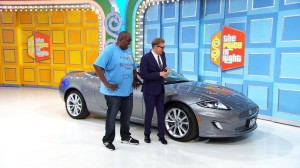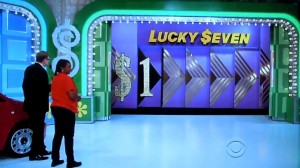
(Photo courtesy @PriceIsRight twitter.)
“Don’t you understand how math works?!” I feel myself constantly screaming at the TV during The Price is Right.
So, this past week was Dream Car week. We’ve already been over how the 1st woman should’ve definitely won her car.
And now we’ve got another person should’ve won.
Look, I know there’s luck involved in most of The Price is Right games. And some numbers are basically arbitrary. (Seriously, how should I know if some trip or some car ends in 30-something dollars or 70-something dollars… You can kind of sort of reason and strategize that out, but not enough that you’re gonna win even close to every time.)
However! There are some mistakes that are just straight math mistakes. And that’s when it gets infuriating. I mean, come on, people! This is your chance! You’ve been given the gift of being on The Price is Right. Please don’t squander it.
And I sort of get it. Because when I was on 1 vs. 100, I made some really, really idiotic mistakes. I sat at home watching my square go read, thinking “What?! I didn’t get that right?! (Whatever that happened to be.)” So, I get it. With the lights and the pressure and all that. I understand if it’s your first game show appearance how you might make a fatal mistake without fully thinking it through.
But, honestly. You have to keep your head about you. You just have to. In most Price is Right games, you are not timed! So take a breath. (I know, I know. I’ve said that before, but it’s so unbelievably true.)
Anyway, back to math. We’ve already discussed the travesty that usually is “Pay The Rent.” But here’s another thing that gets me every time – when people make a fatal mistake with the last number in Lucky 7.

In case you don’t know how you play Lucky Seven: Drew hands you $7. You must have $1 remaining at the end of the game to “buy” the car. The first number of the car is revealed for you. Then you guess each of the next numbers before it’s revealed. For every number you’re off, you pay a dollar. (For example, if you guessed the 2nd number in the price was an 8, but it was a 7, you pay $1. If you guessed a 9 in that scenario, you’d pay $2.)
So on dream car week – for a car worth over $80,000 – a guy gets all the way to the final number… and he still has $3 left to spend! Not a perfect scenario, but at least you have breathing room.
Now, I’ve seen this same type of scenario before during Lucky 7. People get to the end, they get nervous, and just guess a lucky number or a 9 since people think car numbers always end in 9. But here’s the thing… You no longer need to worry about saving any dollars (except of course the one to buy the car)! You need to give yourself as wide of a range as you possibly can.
So, in this dream car week instance – when you have 3 dollars left to lose (in addition to the dollar you need to save), you should never guess anything under the number 4. (Guessing 4 already automatically gives you 1, 2, & 3 since you have a $3 buffer (and there are no 0s in this game.) And you should never guess anything over 6 for the same reason.
Now, if you guess 4, 5, or 6 and you’re still off, then okay. Sucks for you. The last number is sort of arbitrary. What can you really do about it?
But if you guess 7, then the world is going to be screaming at you!
The man guessed 7. And the worst part – the last number in the car was 3!(!!!)
I was yelling at the TV to guess 6 because I feel like cars often do end in 9, 5, or 0. (And 0 isn’t an option in this game.) So, I thought 6 would be the safest bet… And it was a safe bet. But one the guy didn’t take.
And this is a mistake in Lucky 7 that’s been made multiple times!
So, not to be mean to the people who I know are under pressure, many of whom have probably never been on a game show. But I just have to ask again – Do you not know how math works?
Your analysis has one fatal flaw! At the end of the game, the player needs to have at least $1 left. Therefore, even if he guessed 6 and the last digit was 3. He would still lose the game because he would have to pay a difference of $3, leaving him no money to but the car. Therefore guessing 7 was totally reasonable since he only had range of 2 as a buffer.
Hi Jason! Thanks for commenting. I’m sorry I was unclear. I meant he had $3 left to lose. (And he’d still have a dollar remaining).
I’ve added the following phrases after “$3 left” in two different sentences: “to spend” in one, and “to lose (in addition to the dollar you need to save)” in another sentence.
Hopefully that helps with the clarity of the post. Thanks again for commenting and pointing that out, and have an awesome day!